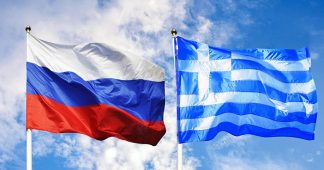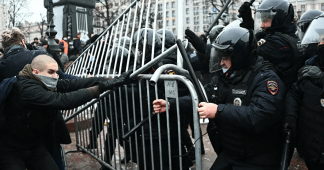24 Apr, 2021
Western countries are living in a grim “fantasy land” they’ve created through years of anti-Russian propaganda, the outspoken Maria Zakharova told RT DE, with any initiative by Moscow – even on Covid-19 – becoming politicised.
Such behavior on the West’s part is hardly surprising, the Russian Foreign Ministry spokeswoman explained to Thomas Fasbender in an exclusive interview, given the efforts that Western counties have put into painting Moscow as an “aggressor” over the years.
The consistently cold relations between the West and Russia have been heightened by a series of major scandals recently, she outlined, despite these being based on imaginary grounds. For instance, military drills in Russia’s southeast have prompted hysteria in multiple NATO countries and a fresh wave of doomsday predictions regarding an impending war between Russia and Ukraine – which, again, did not happen.
“It seems to me that our Western partners have let their imaginations run wild. They seem to be seeing things when there’s nothing there, and not seeing the obvious. It’s an amazing thing, really, to be able to live in fantasy land,” she said.
If you spend years communicating an idea to your own people and to the world at large, using mass media, issuing reports and making alarmist publications that depict Russia as a warmonger nation that’s about to strike – then, sure, even run-of-the-mill military drills would get people scared out of their senses.
The years-long Western campaign to paint Russia as an “aggressor” state has also affected the global response to the coronavirus pandemic, Zakharova believes. Instead of cooperating with Russia and buying its Covid-19 Sputnik V vaccine, the first in the world to be registered, too much effort has been put into trying to deny its very existence and otherwise tarnish its reputation.
“There was a major campaign against our vaccine, against what we had to offer the world. We handled it. Unfortunately, many countries, including EU states, wasted time,” Zakharova said. “Many states received this vaccine, some on a trial basis. Many of them began to buy it right away. Unfortunately, the EU is punishing itself again, just as Prague did with our diplomats.”
The ongoing coronavirus crisis has “highlighted massive problems in the EU and the West as a whole,” as they had all the resources to lead the global fight against the disease, but failed to do so.
And it turns out that leaders who call themselves leaders of the world aren’t really leaders. They are just chest-puffers.
A similar lack of ability to act as an independent entity has been demonstrated during another ongoing scandal – the spy affair launched by Prague. The Czech Republic has accused Russian military intelligence of blowing up its ammunition depot back in 2014. While no solid proof of Russia’s alleged involvement has been presented, Prague launched a diplomatic broadside, opting to expel Russian diplomats.
“They got what they wanted. I would even say that they got what they couldn’t dream about. I think that when Prague started this reckless game, it didn’t bother to calculate the consequences,” Zakharova said, adding that it was unlikely that the Czech Republic decided to trigger the bitter spat on its own.
They didn’t realize what they were signing up for, what their Western supervisors were dragging them into. And when they realized what was happening, it was too late, and they were probably not allowed to take a step back.
An unexpectedly strong reaction by Moscow, which did not use its usual mirror approach this time, caught the Czechs by surprise. “That’s why we are seeing such absurd actions and contradictory statements. They kept saying different things about the explosions and accusations against Russia. There were a lot of mixed messages, a cacophony of voices, so to speak,” Zakharova added.
Published atwww.rt.com











